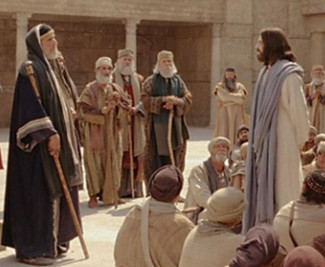31st Sunday in Ordinary Time - We Are a Broken People
We are a broken people. We always have been. From the first moments of history, mankind has been frail against the elements, weak against his enemies, selfish and self-centered in regard to his fellow man. Deep within our beings we have always longed to become whole, to be complete, to find peace, to experience love and to give of ourselves totally to another. But we also know that we cannot achieve this on our own.
 Maybe that is why periodically throughout our history God has entered into a covenant with mankind.
Maybe that is why periodically throughout our history God has entered into a covenant with mankind.
We meet the word covenant frequently in both the Old and New Testaments. It is an ordinary, secular word which does not in itself have any special technical or spiritual meaning. But the very word covenant is a dangerous one because its common use from ancient times even until now has always been connected with legal and binding agreements with penalties for their infraction.
And if there has been a common and recurring weakness of the Judeo-Christian tradition, it has been a tendency towards legalism both in theology and ethics. Again and again we tend to distort and limit God and his will for man by attempting to put into legal systems truth that is better expressed in liturgy and worship, and to put into abstract rationality and logic insights and values better expressed in poetry and music.
When it comes to biblical covenants, a couple of points are important to consider.
First of all, in all covenants between God and man there is always a firm emphasis on God's initiative and God's love. The covenant is never a pact between equals. It is not some kind of negotiated settlement. It is always God who takes the first step. In the Old Testament, for example, the covenant with Noah is established very much in terms of God's own initiative. With regard to Abraham, God again makes the first approach. The redemptive and spiritual covenant always has as its background God's own grace. God announces His promises and lays down His terms. That is especially true, of course, in the Christian covenant. Man does not negotiate his own salvation with God. The whole process has its origin in God extending His arms in a loving embrace.
Secondly, the covenant is always two sided. Sometimes the importance of God's initiative is emphasized in such a way as to minimize the importance of man's response. But a covenant is by definition bilateral, and when it comes to the redemptive covenant, this is no less so. It is true that God takes the initiative and that God bears the cost. Yet the human response always remains an important element. If we go back, for example, to the Abrahamic covenant, we find a clear emphasis on the part played by Abraham's faith. There is no covenant without this human response.
Most of us are more at home in rational discussion than we are in joyous celebration. Faith can become merely a matter of routine - of fulfilling customs and obeying laws, but lacking the fire that gives vitality and direction to daily life.
Jesus' simple statements in today’s Gospel embrace everything we need to do to emerge from our brokenness and become whole. They remind us of the covenants that God has continually made with us and are a foretaste of the New Covenant that Christ has made with His blood. And yet, they demand a radical change in our lives and a radical change in our whole perception of religion and faith.
We are all made in God's image and likeness. We are called to reverence the Lord in the many ways in which He is present in his world. When we love others, we are loving people who themselves are broken, but who are unique reflections of the presence of God. We cannot do otherwise.
When Christians first gathered, they celebrated a faith in the risen Jesus that gave an entirely new direction to their lives. Their coming together in prayer and worship gave them a chance to celebrate their new life, to share the Word that illumined their faith, to break a bread that would make them whole again and keep the memory of Jesus alive for them.
And each time we gather together, we share the same life the first Christians knew in their gatherings. We celebrate common rites of passage, everyday joys and struggles, and our responsibility for each other.
We know the covenant. Let us rejoice in it. Let us come with thankful hearts for God and his Gift in Jesus Christ, looking forward to resurrection and hope even as we remember the cross and suffering.